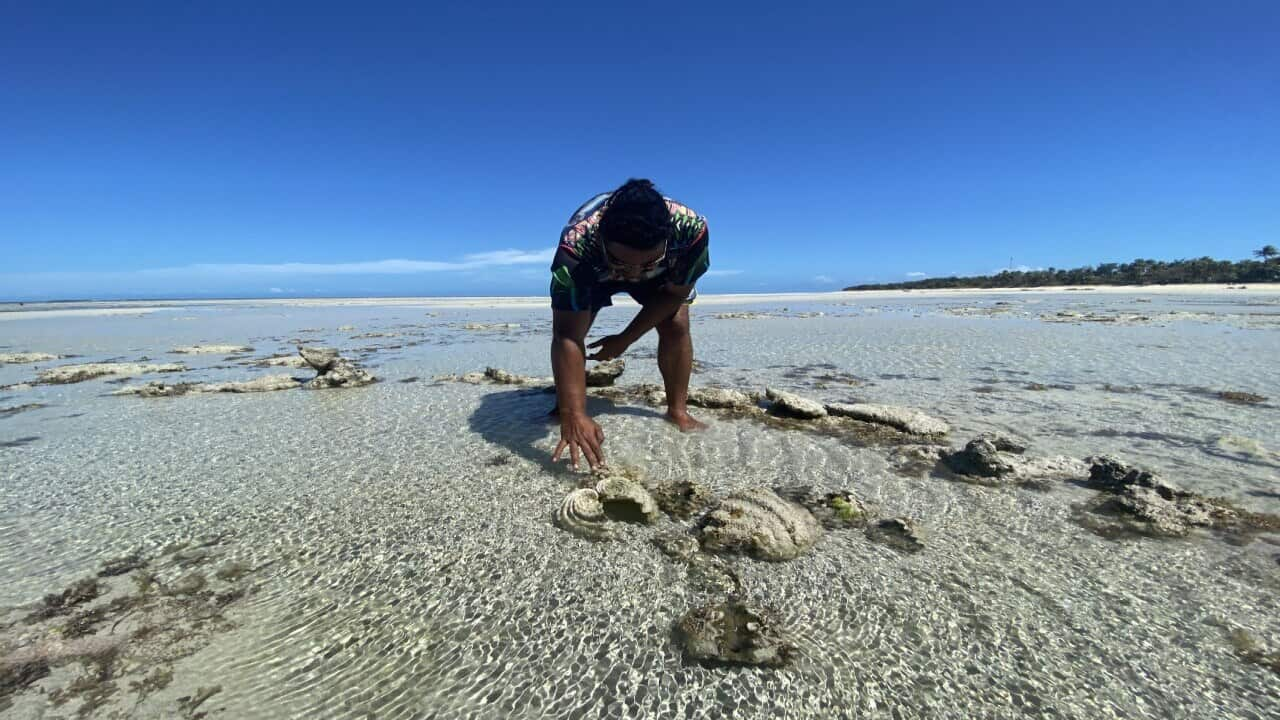The push to save the Torres Strait Islands in the face of climate change has received a boost from international scientists.
The United Nations' newly released Intergovernmental Panel of Climate Change’s (IPCC) Sixth Assessment Report calls on all politicians to act immediately to protect the region against rising seas and erosion.
The Torres Strait 8 claimants, alongside 5 industry experts have backed up the report and shared their own aspirations for their homelands.
They've pushed for funding for self-determined adaptation programs, investment in community-led and owned renewable energy development, a transition away from fossil fuels and a commitment to 100 per cent renewable energy within a decade and advocacy from the government to encourage international nations to combat climate change.
The IPCC report will be delivered to Australian politicians.
Masigilgal Traditional Owner and Torres Strait 8 claimant, Yessie Mosby hopes it will be received with accountability.
"It's a nail on the head when we have the IPCC scientists . . . confirm that this is thing is real. It affects not only islands, but it's behind bushfires and floods. It all comes under the category of climate change,” said Mr Mosby.
“I really want government to take it on their shoulders and act upon this in the next 10-years, or quicker. Don't leave it for 30 and 50-years, because if you leave this then Australia will lose their second most-longest surviving Indigenous race of people. Gone.” Torres Strait Islander woman from Masig Island and SEED Indigenous Youth Climate Network Campaign Director, Tishiko King told NITV News turning the tide means empowering the self-determination of Torres Strait Islander communities.
Torres Strait Islander woman from Masig Island and SEED Indigenous Youth Climate Network Campaign Director, Tishiko King told NITV News turning the tide means empowering the self-determination of Torres Strait Islander communities.

Tishiko King in Glasgow. Source: Supplied
“We need our First Nations, and our island people, leading that fight. It needs to be illustrated that it is climate justice, because our lives depend on it,” she said.
“In this critical time, the IPCC really highlighted the vulnerabilities of our communities, we need to reshape our politics. We need to make them really accountable to create the sustainable future that we want, and to be honest – our people deserve.”
“It shouldn’t be about profit over people.”
Rising seas and erosion
Speaking to NITV News from his homeland of Masig Island, Mr Mosby shares stories of collecting the remains of his relatives from the ocean.
"It's not normal to walk on the beach with your children to pick up human remains like they were shells. Especially when you are connected to that person, that person gave life to your grandmother, your great-grandmother, your great-grandfather, your grandfather, or your father,” he said.
"It is scary, but we've identified the problem. We know the situation is because of climate change, global warming.” Mr Mosby said it’s painful to see communities that have contributed the least to climate change, bear the brunt of it.
Mr Mosby said it’s painful to see communities that have contributed the least to climate change, bear the brunt of it.

Yessie Mosby fears his home and culture is at risk of vanishing. Source: Abbie O'Brien/SBS News
“It's like us, here and now, our people here in the Torres Strait, we didn't do anything wrong. We lived right," he said.
“We haven't contributed nothing, but yet we are the first one on the line facing everything. It makes it so much harder that we are living in one of the most remote areas of Australia.”
For Ms King, the realities of the crisis hit her when she returned to Country.
“The people of Masig are so strong, their resilience to adapting to using materials is so incredible. They were using pallets from forklifts, and packed it with palm leaves and coconut husks because of the lack of infrastructure for seawalls,” she said.
“It’s hard to understand that urgency until you see it. And seeing that has only built that fire up in me to make sure that our claimants and their stories from community are heard.”
With a big fight still ahead, Mr Mosby finds strength in continuing the legacy of his people.
"We survived for over 60,000-years here on this island in the Torres Strait. We have been fighters all along. We fought for survival, we fought through thick and thin physically, spiritually and mentally. We fought through the sickness that was introduced to us, we are still fighting today,” he said.
"We will fight through to the thick and thin in any which way to make sure we can save our home and live here for another 100-years, another 300-years, or even another decade. We want the generations to come to live here, and live a happy life.”









